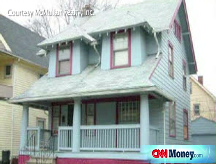Foreclosures up a record 81% in 2008
Filings continued to soar through the end of the year - and there's no relief in sight for 2009.
NEW YORK (CNNMoney.com) -- U.S. foreclosure filings spiked by more than 81% in 2008, a record, according to a report released Thursday, and they're up 225% compared with 2006.
A total of 861,664 families lost their homes to foreclosure last year, according to RealtyTrac, which released its year-end report Thursday. There were more than 3.1 million foreclosure filings issued during 2008, which means that one of every 54 households received a notice last year.
"Clearly the foreclosure prevention programs implemented to date have not had any real success in slowing down this foreclosure tsunami," said James Saccacio, CEO of RealtyTrac in a statement.
And despite those efforts on the part of both the government and the banking industry to quell the housing crisis, defaults continued to climb as 2008 came to an end. Foreclosure filings were up 17% in December over November, and rose 41% compared with December of 2007.
"The big jump in December foreclosure activity was somewhat surprising given the moratoria enacted by both Freddie Mac (FRE, Fortune 500) and Fannie Mae (FNM, Fortune 500), along with programs from some of the major lenders and loan servicers aimed at delaying foreclosure actions against distressed homeowners," said Saccacio.
Both of the government-sponsored mortgage giants suspended foreclosures starting November 26, 2008 through January 31, 2009.
The devastating numbers are unlikely to improve soon.
"I don't see how we can avoid three million foreclosures again in 2009," said Rick Sharga, a RealtyTrac spokesman. His company now has nearly a million sales listings for bank-owned homes.
And what's worse, Sharga thinks that as many as 70% of the bank-owned homes listed on RealtyTrac's site have not yet been posted on multiple listings services (MLS), the industry databases of homes for sale. Those homes are less likely to be sold because most real estate agents won't know they're available.
"Either banks are overwhelmed and can't get the houses on the MLS quickly, or they're deliberately slowing down so they don't have to take markdowns to actual home values on their books," Sharga said. Either way, it has the effect of underestimating the foreclosure inventory problem.
Banks also seem to be slowing the foreclosure process, according to Sharga. They are not sending out foreclosure filings as quickly when homeowners fall behind on payments.
Part of that is because some new state regulations require banks to notify delinquent borrowers of their intent to file notices of default, and to offer help to borrowers who want to get their finances back on track. Banks simply lack the manpower to track down so many delinquent homeowners with the required notifications. This creates a delay between the time that borrowers first miss payments and when they go into foreclosure.
After one such rule took effect in California this past summer, notices of default fell by half, to 21,665 from 44,278. But they jumped back to more than 44,000 again in December, probably because banks caught up on many of the postponed notices.
"The recent California law, much like its predecessors in Massachusetts and Maryland, appears to have done little more than delay the inevitable foreclosure proceedings for thousands of homeowners," said Saccacio.
Foreclosures are closely tied to home prices - they tend to rise as prices fall. And nationally, home prices have fallen more than 21% from their peak, according to the S&P/Case-Shiller Home Price index. In many areas, the decline has been much worse.
In Los Angeles, San Francisco and Miami prices are down 30% or more. They've fallen more than 40% in Phoenix and nearly that much in Las Vegas.
Declining prices put many homeowners "underwater" on their mortgages, owing more than their homes are worth, which makes them more likely to default.
And adding a flood of bank-owned homes to already slow markets further outstrips demand and dampens prices, creating a spiral of lower prices and higher foreclosures.
As a result, more homeowners who fall behind on their mortgage payments end up losing their homes, according to Jay Brinkman, the chief economist for the Mortgage Bankers Association
In California and Florida 80% of the homeowners who miss a payment end up in foreclosure, according to the MBA. That's a much, higher percentage than in the past.
"The number of mortgages 30 days past due are still below what they were during the 2001 recession," said Brinkman. But the proportion of those loans that went into foreclosure was much lower, he added - about 10%.
"Delinquency itself has become a much clearer predictor of foreclosure," said Sharga.
If home prices keep plunging, the foreclosure scourge will likely continue.
And S&P's chief economist, David Wyss, expects home prices to continue to decline, bottoming in early 2010 roughly 33% below their 2006 peak.
The three states hit hardest by foreclosure in 2008 were Nevada, Florida and Arizona. In Nevada, 7% of homes received a foreclosure filing - such as a notice of default, auction sale notice or foreclosure sale - during the year, up 126% from 2007.
Florida filings soared 133%, hitting more than 4.5% of all households, while Arizona filings jumped 203%, also to about 4.5%. California had the highest total number of filings for any state, 523,624, more than double 2007 levels.
Stockton, Calif. had the highest rate of foreclosures of any metropolitan area, at 9.5%. Las Vegas was second with 8.9% and Riverside/San Bernardino Calif. was third with 8%.
Of the top 20 cities for foreclosures, most are in the Sun Belt, with the exception of Detroit at number 10, Memphis, which ranked 18th and Denver which was 19th. ![]()



